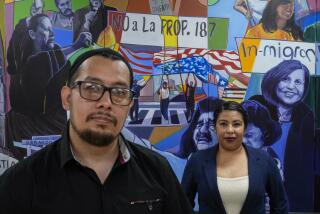New Immigration Bill a Boon to Haitians
- Share via
WASHINGTON — The new immigration bill promises to resolve the long-contentious issue of what to do about thousands of Haitian boat people, granting them the same legal status already given Cubans and shortening their path to citizenship.
The Jimmy Carter Administration put many of the Haitians who poured onto U.S. shores in the late 1970s into a status of limbo by labeling them “entrants,” along with Cubans who also left their homeland in the massive boatlifts of 1980. The status of the Cubans, however, was taken out of limbo when the Reagan Administration granted them legal status in 1984.
Now, nearly all Haitian immigrants may become legal residents--and many will be eligible for naturalization as citizens soon. Those who had “any record” with the Immigration and Naturalization Service before Jan. 1, 1982, may seek legal status under a special provision of the immigration measure called “Cuban-Haitian adjustment.” They could be granted permanent residency under this provision.
Retroactive Status
As permanent residents, this group could apply for citizenship almost immediately. Their permanent status would be retroactive to Jan. 1, 1982. And citizenship may be sought by permanent residents after five years, making many of them eligible to apply for citizenship at the first of the year.
Others who have lived here continuously since before Jan. 1, 1982, could seek legal status as temporary residents under the legislation’s general amnesty provisions.
Under the special provision, INS lawyers said, people do not have to prove that they will not be a public charge; under the general amnesty program, illegal aliens must present such proof. The distinction is made because, under their “entrant” status, the Haitian newcomers were provided some government social services.
Within Two Years
Haitians and those few Cubans who still have not sought permanent residency must apply for the legal status within two years after enactment of the legislation.
Advocates for Haitian immigrants praised the new provision. But some expressed reservations about how the government will implement it, charging that Haitians have been treated less fairly than Cubans in the past.
“I think (the provision) is a very positive aspect of the bill,” said Ira Kurzban, a Miami lawyer long active in Haitian immigration causes. “But, before we can determine how many people can be covered by it, we have to see the INS regulations.”
Like other provisions in the landmark immigration legislation, the implementation of the Cuban-Haitian adjustment depends somewhat on specific INS regulations, governing such provisions as what documents will be acceptable as proof of residency.
Cuban Program Cited
Michael S. Hooper, executive director of the National Coalition for Haitian Refugees, called the adjustment “one of the few bright spots in an otherwise checkered package” of immigration reforms and asserted that implementing it should be easy because the Cuban program can serve as an example.
Gerard Jean-Juste, executive director of the Haitian Refugee Center in Miami, said the Haitian community “will have more political clout” as more of its members are granted citizenship.
However, he complained, the new legislation does not cover those who fled the Jean-Claude Duvalier regime since 1982 and remain illegal. The U.S. government has rejected claims that they should be granted refugee status because they fled political oppression.
“The Reagan Administration has denied them justice,” Jean-Juste said.
Nevertheless, the new legislation appears to be an effort to make up for what Haitians have perceived as unfair treatment in the past.
More to Read
Sign up for Essential California
The most important California stories and recommendations in your inbox every morning.
You may occasionally receive promotional content from the Los Angeles Times.










